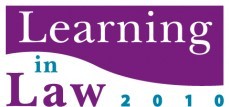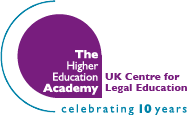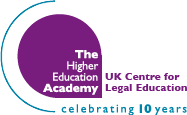Papers and posters presented at the 2010 conference

A total of 42 papers, based around the broad themes of academic futures, currculum change, progress in pedagogy and the student life cycle, were presented in five parallel sessions, and two academic posters were displayed.
You can read the presenters’ abstracts, session reports and other comments below, as well as download full papers, slides and posters where available.
Highly illuminating sessions, with inspiring speakers and a free flow of creative innovative ideas demonstrating the extent of imagination in teaching and learning law…developed my knowledge and understanding of pedagogic methods and the wider issues facing education providers.
Parallel session 1
- Can the traditional law curriculum be delivered via clinical and experiential learning? – Kevin Kerrigan, Jonny Hall & Adam Jackson (Northumbria University)
- The Leeds integrated skills model – Neil Stanley (University of Leeds)
- Pathways in legal education: taking the right route? – Sonia Kalsi & Deborah Sharpley (College of Law)
- Are we using technology for technology’s sake? An evaluation of a simulated employment exercise – Amy Musgrove & Vicky Thirlaway (Leeds Metropolitan University)
- Socrates and Confucius: a long history(?) of information technology in legal education – Abdul Paliwala (University of Warwick)
- Of wars, skirmishes and peaceful interludes: the legal academy and the legal profession – Fiona Cownie (Keele University)
- Boosting the life cycle of the law teacher: from rookie to academic rock star – Scott Taylor (University of St Thomas, USA)
- Can the new A level curriculum meet the demands of higher education? – Birju Kotecha (St John Rigby College)
- Web 2.0 and unconventional sources: paradigm shift for law student essays? – Michael Bromby (Glasgow Caledonian University)
Parallel session 2
- Reforming the curriculum of the Postgraduate Certificate in Laws at HKU: revolution or evolution? – Wilson Chow, Julienne Jen & Firew Kebede Tiba (University of Hong Kong)
- Things aren’t what they used to be: collective responses, spiralling skills and the curriculum – Helen Carr & Kirsty Horsey (University of Kent)
- International website for teaching ethics and professionalism – Charlotte Alexander (Georgia State University, USA), Nigel Duncan (City University) & Paul Maharg (then University of Strathclyde)
- Perspectives on professional formation: apprenticeship, pupillage and the assessed year in employment – Gillian McGaughey (Institute of Professional Legal Studies, Queen’s University Belfast)
- Interdisciplinary learning for the work-based student – Caroline Coles (De Montfort University)
- The pedagogic impact of law school sabbaticals – Maureen Spencer & Penny Kent (Middlesex University)
- Empirical research in the undergraduate curriculum – Caroline Hunter (University of York)
- Law in Action: integrating social justice issues into the curriculum using clinical legal education – Rosie Harding & Andrew Francis (Keele University)
- The challenge and opportunities of contextualising legal education – Alexandra Dobson (University of Wales, Newport)
Parallel session 3
- Access to legal work experience: lessons for legal education – Andrew Francis (Keele University) & Hilary Sommerlad (Leeds Metropolitan University)
- The firm as a new actor in legal education: implications for lawyers’ identity formation – James Faulconbridge & Andrew Cook (Lancaster University)
- Peer assisted learning: the mentor’s experience – Sue Warnock & Bryan Scant (Bournemouth University)
- Using PebblePad e-portfolios to support PDP, career planning and reflective learning within the law curriculum – Sefton Bloxham & Fiona Boyle (University of Cumbria)
- The emerging use of storytelling as an alternative teaching methodology to the appellate case law method – Michael Blissenden (University of Western Sydney, Australia)
- Exhuming human remains from case law: a report on the first dig – Dawn Watkins (University of Leicester)
- Using oral assessment to improve student learning in law – Chloe Wallace (University of Leeds)
- The first year experience of assessment – Alison Bone (University of Brighton)
- Innovations in assessment: the role of blended learning as a support mechanism for assessment – Sarah Field & Lucy Jones (University of Brighton)
Parallel session 4
- Law school dreams: imagining the shape of law schools – Roger Burridge (University of Warwick), Imelda Maher & John O’Dowd (University College Dublin)
- Open educational resources: why they matter – Paul Maharg (then University of Strathclyde)
- Teaching professional skills to distance learning students through the medium of film – Edward Stone, Elizabeth Harding & Lisa Kidger (ILEX Tutorial College)
- Creative critical learning: Act 2 – Grier Palmer (University of Warwick)
- Developing critical thinking: student perspectives on the teaching of analytical thinking and legal problem solving skills – Angus Nurse (University of Lincoln)
- In the looking glass: a reflection on past experience as a key to the future – Carol Boothby (Northumbria University)
- Culture shock: I don’t understand what plagiarism means – Martin Jones (Glasgow Caledonian University)
- Are we all going to the same place: pluralism and value driven legal education – Rebecca Huxley-Binns (Nottingham Law School)
Parallel session 5
- Developing threshold concepts in legal education – Helen Carr (University of Kent), Caroline Hunter (University of York), Ray Land (University of Strathclyde), Julian Webb (UKCLE) & Elaine Webster (University of Strathclyde)
- Avoiding pedagogy road blocks to create advances in the delivery of legal education – Steven Friedland (Elon University, USA)
- Doing diagnostics: accounting for progress in student communications and advocacy – Bonnie McAlister (Elon University, USA)
- Look it up before you leap: guiding students across the academic-vocational legal resources divide – Marcus Soanes (City University)
- Developing students’ critical thinking skills through peer assessment and information literacy – Richard Owen (University of Glamorgan)
- The impact of cyberspace on legal development: the case of Islamic law – Shaheen Ali (University of Warwick)
- Interactive learning in an eConfucius drama classroom – Amy Shee (National Chung Cheng University, Taiwan)
Posters
- Moving from lectures to transactional learning: simulating probate – Tom Serby (Anglia Ruskin University)
- Using podcasts to develop students’ referencing skills using OSCOLA – Penny English (Anglia Ruskin University)
Last Modified: 9 July 2010



Comments
There are no comments at this time